











































Becker’s video series, tackles some of the unique problems that homeowners and renters face today. We answer questions, no matter how far-fetched they may seem. From service animals to nudists in your community, we get to the bottom of it and let you know – “Can They Do That?”
BECKERLAWYERS.COM/CTDT

The Community Association Leadership Lobby (“CALL”) provides an avenue for community leaders to become engaged in the legislative process. Stay informed on key issues and help influence new legislation in Florida’s Capitol.
CALlBP.COM


Annual meeting preparations and important association votes are big responsibilities. Are you ready?. Streamline operations for your community with two products that were designed with you in mind. Our online voting software, BECKERBALLOT.COM, and our website development platform, MYCOMMUNITYSITE.COM simplify the jobs of board members and property managers everywhere.
At Becker, your success is our number one priority. Our Community Association Practice offers a variety of benefits to help your community thrive. From educational classes, to video series, podcasts, and more, we’re here to help make your job as a board member or community manager as easy as possible. Make sure to take advantage of these resources and please reach out should you have any questions.

Leading community association attorney Donna DiMaggio Berger acknowledges the balancing act without losing her sense of humor as she talks with a variety of association leaders, experts, and vendors about the challenges and benefits of the community association lifestyle.
TAKEITTOTHEBOARD.COM

Did you know Becker provides over 200 educational classes per year throughout Florida on a variety of topics ranging from board member certification to compliance, and everything in between? Our most popular classes are available online!
BECKERLAWYERS.COM/CLASSES

The Florida Condo & HOA Law Blog provides readers with up-to-date analysis of issues affecting associations in Florida. With many years of cumulative experience, our blog authors are community association attorneys who help to keep you apprised of important issues affecting your community.
FLORIDACONDOHOALAWBLOG.COM
beckerlawyers.com






In William Shakespeare’s play Romeo and Juliet, Juliet asks, “What’s in a name? That which we call a rose by any other name would smell as sweet…” What is in a name and how important could it be to your community association?
In his article on page 12 Kevin Edwards with Becker helps communities think carefully about the use of the terms surveillance versus safety when it comes to video cameras. Edwards says if a community installs “security cameras,” then they have taken on a duty to provide security, and they must then provide this security in a non-negligent manner. Thus, the community becomes exposed to liability as is shared in detail in the article by the court’s ruling in Vazquez v. Lago Grande Homeowners Ass’n
One of the lessons to be learned Edwards shares, “Associations may wish to be careful not to label the video cameras as ‘security cameras’ and instead let the owners know that the cameras are for surveillance purposes only.” To return to Juliet’s previous question, calling a surveillance camera a safety camera might show the association what’s in a name, and it will most likely not end with a sweet smell or taste.
The April issue also focuses on those who reside in homeowners’ associations. Leaf through the magazine to page 24 and read the article “What Do Florida’s HOAs Need to Know” to have several best practices presented about HOA living.
On page 44 Solitude Lake Management shares the issue of toxic water caused by cyanobacteria that can lead to harmful algal blooms (HABs) in lakes and ponds. The article explains what HABs are, how they develop and can be identified, and how they are to be managed so your association’s lakes and ponds look their best and so your homeowners don’t have to be concerned about their health when it comes to the community’s waterbodies.
On page 50 Unicoat Roofing offers eight money-saving roof maintenance steps. One of those steps is to repair minor cracks or unsealed areas before heavy rain can penetrate the structure, and another is to consider ways to lower energy costs over time. Read the entire article for all the tips.
If you have any comments, reach out to FLCAJ at 800-443-3433 or email mhamline@fcapgroup.com.
 Editor
Editor
Publishers Richard Johns
Dana Johns
Editor Michael Hamline
Art Director Nick Walker
Advertising Sales
Phone: (800) 425-1314
Email: info@fcapgroup.com
Circulation/Accounting Tammy Hanner
Phone: (800) 443-3433
Fax: (501) 280-9233
Editorial
Phone: (800) 443-3433
Fax: (501) 280-9233
FCAP Coordinator Dana Johns
Phone: (800) 443-3433
Email: djohns@fcapgroup.com
Florida Community Association Journal is published monthly by True Source Publishing LLC 1000 Nix Road Little Rock, AR 72211-3235
Email: info@fcapgroup.com
Website: FCAPgroup.com
Copyrighted by Florida Community Association Journal. Reproductions of any part of this publication without written permission of the publisher are prohibited.
Subscription Rates
$24 for one year, $48 for three years. Back issues are $5 each plus postage. Group rates for 3 or more people are available at $12 per person.
The publisher and editor(s) of this magazine do not accept responsibility for the content of any advertisement, including statements made by advertisers herein, or for the opinions expressed by authors of by-lined articles. The publisher and editor(s) also reserve the right to reject any ad or article for objectionable content in verbiage or images. The intent of this publication is to provide general information only and is not intended to provide specific advice or recommendations. Appropriate legal, financial, or engineering advice or other expert assistance should always be sought from professionals.
Postage paid at Little Rock, AR and additional offices (permit #1085).
Postmaster
Send address changes to:
Florida Community Association Journal 1000 Nix Road Little Rock, AR 72211-3235
or email info@fcapgroup.com




Ansbacher Law, with board certified partners, 11 attorneys and over 30 professionals, is available to serve your community throughout Florida.
• Full service law firm for your Condominium or Homeowners Association.
• Florida’s leading construction defect team - Full contingency available, no fees or costs unless you win.
• Collections handled on deferred and contingency fee arrangement.



In the case titled The National Small Business United, d/b/a the National Small Business Association, et al v. Janet Yellen, in her official capacity as Secretary of the Treasury, et al. , Case No. 5:22-cv-1448-LCB, United States, District Court, Northern District of Alabama, Northeastern Division entered on March 1, 2024, the court found the CTA to be unconstitutional.
By way of background, in 2021 Congress passed the 1500-page National Defense Authorization Act (the NDAA) and included within it the 21-page
Corporate Transparency Act (the CTA). In brief the CTA would have required just about every entity registered with the secretary of state in each state, which includes community associations, to provide certain information about its “beneficial owners.” In the case of a community association, board members and officers would need to provide the name, date of birth, current address, and an identification number from a driver’s license, state ID card, or passport and a copy of such document. The purpose of the CTA was to prevent financial crimes, money laundering, tax evasion, and even the funding of terrorism. While there are limited exemptions, community associations were not included in these exemptions, notwithstanding lobbying efforts of the Community

Attorney Jeffrey Rembaum has considerable experience representing countless community associations that include condominium, homeowner, commercial, and cooperative associations throughout Florida. He is a board-certified specialist in condominium and planned development law and is a Florida Supreme Court circuit civil mediator. Every year since 2012 Mr. Rembaum has been inducted into the Florida Super Lawyers. He was twice awarded as a member of Florida Trend’s Legal Elite. Kaye Bender Rembaum P.L. is devoted to the representation of community and commercial associations throughout Florida with offices in Palm Beach, Broward, Hillsborough, and Orange Counties (and Miami-Dade by appointment). For more information, visit kbrlegal.com.
Associations Institute lobbyists. Failure to comply with the CTA can lead to expensive civil financial penalties and significant time in federal prison.
In finding the CTA unconstitutional, the Northern District of the Northeastern Division Alabama appellate court noted that “Congress sometimes enacts smart laws that violate the [United States] Constitution…this court’s job is to consider whether the CTA follows the [United States] Constitution, not whether it is good policy.” The wise court asks, “Does Congress have authority under the Commerce

Clause [of the United States Constitution] to regulate non-commercial, intrastate activity when certain entities, which have availed themselves of the state’s incorporation laws, use channels of commerce, and their anonymous operations substantially affect interstate and foreign commerce? The Supreme Court’s Commerce Clause decisions all point to the same conclusion: “No.”
The written opinion in this case makes for great reading most especially for those interested in Constitutional law analysis. At the end of the day, the drafters of the CTA and the lawyers for the Secretary of the Treasury defending the CTA failed to take into account that the CTA does not regulate economic or commercial activity on its face, which is generally required if one wants to rely on the Commerce Clause of the United States Constitution to justify the constitutionality of certain laws. The court even gently points out how the CTA could have been made constitutional through better drafting, rather than “inartful drafting” and even points out, relying on a prior Supreme Court case, “that it is beyond this Court’s province to rescue Congress from its drafting errors, and to provide for what we might think is the preferred result.” Lamie v. U.S. Tr. , 540 U.S. 526 (2004).
While this is just the beginning of the CTA appellate fight, and no doubt the government will appeal to the United States Court of Appeals

for the Eleventh Circuit, which will most likely lead to the loser of that challenge appealing to the United States Supreme Court, at least for now the CTA’s registration requirements due by December 31, 2024, appear to be dead on arrival. However, the court only went so far as to declare the CTA unconsitutional against the plantiffs in the lawsuit. Whether the court's opinion will have a broader application to all coporate entities remains to be seen. With this in mind please be sure to check with your association's attorney as to whether your association is still required to comply with the CTA by December 31, 2024. At the moment the chances are that is so required. n


Many associations have installed video surveillance cameras within the community common areas as a means to provide security for their residents. However, good intentions often lead to unanticipated consequences. In fact, the use of video cameras may expose an association to liability.
Generally, an association is not a guarantor or insurer of any per-
son’s safety and is not obligated to provide “security” to its residents. However, once an association assumes a duty to provide security, it must do so in a nonnegligent manner. This may very well be the case with installing “security cameras.” Florida courts have routinely held that if an association undertakes, or appears to undertake, the duty to provide security for its community, it must also take certain measures to prevent criminal activity from occurring on the premises.
For example, the court in Vazquez v. Lago Grande Homeowners Ass’n , 900 So. 2d 587 (Fla. 3d DCA 2004), ruled that the association had a duty to exercise reasonable care to guard its residents against crime or criminal activity because the association had undertaken the responsibility

Mr. Edwards manages the community association practice in Becker’s Sarasota office and serves as corporate counsel to hundreds of condominium, cooperative, mobile home, and homeowners’ associations located in Sarasota, Manatee, Charlotte, and Highlands Counties. Mr. Edwards is also one of only 190 attorneys statewide who is a board-certified specialist in condominium and planned development law.
In addition to his extensive experience as a community association lawyer, Mr. Edwards has trial and appellate experience in many areas of corporate and civil litigation, construction litigation, covenant enforcement, real estate, and foreclosure law.
For more information, call 941-366-8826, email kedwards@beckerlawyers.com, or visit www.beckerlawyers.com
to provide such security. In this case the association was a gated community with a guardhouse staffed 24 hours a day. The developer marketed the complex on the basis of safety, and the association collected a specific part of its assessments to provide for security. A resident of the association moved into the community because it appeared safe and was gated. The resident had many visitors, including a former neighbor and the neighbor’s children. One day the former neighbor’s estranged husband came into the community to pick up his children and got into an argument with the resident. Thereafter, the resident



We strive to be the industry leader with a superior reputation for providing tailored, high-end management solutions in partnership with the Community



GENERALLY, AN ASSOCIATION IS NOT A GUARANTOR OR INSURER OF ANY PERSON’S SAFETY AND IS NOT OBLIGATED TO PROVIDE “SECURITY” TO ITS RESIDENTS. HOWEVER, ONCE AN ASSOCIATION ASSUMES A DUTY TO PROVIDE SECURITY, IT MUST DO SO IN A NONNEGLIGENT MANNER.
instructed the association’s security guards not to let the estranged husband into the community. Despite this, the security guards allowed the estranged husband to enter the community, and he shot the resident, shot and killed his ex-wife, and killed himself. The court found that the association had breached its duty to provide security because it continued to employ the security guards despite knowing that they routinely let unauthorized individuals into the community. Therefore, the association was found liable for the death of a visitor and injury of a resident.
Thus, associations may wish to be careful not to label the video cameras as “security cameras” and instead let the owners know that the cameras are for surveillance purposes only. As previously mentioned, associations have no duty to provide security, and having “security cameras” will lead owners to believe that the association is providing security.
Regardless of whether the association uses video cameras, it is still liable for criminal conduct that is reasonably foreseeable. In Czerwinski v. Sunrise Point Condominium, 540 So. 2d 199 (Fla. 3rd DCA 1999), the court ruled that a landlord generally has no duty to ensure the safety of its tenants or to protect them from the criminal acts of third persons unless the criminal occurrence is reasonably foreseeable. The court further noted that the landlord’s knowledge of prior crimes, against both persons and property, is relevant to the issue of foreseeability, even if the prior criminal acts are lesser crimes than the one committed against the plaintiff.
Based on these cases, community associations have been held liable in tort for failure to take precautions against criminal activities committed


against the owners and residents if those criminal activities are reasonably foreseeable; and in addition they have been held liable when they voluntarily provide security services but fail to provide them in a reasonable manner.
Thus, if the association is inclined to install video cameras, it must do so in a reasonably prudent manner and should make sure the cameras are always being maintained in good condition and repaired as needed.
Another issue with providing cameras in the community is whether or not the cameras record audio. Florida law (Section 934.03, FS) makes it illegal to intentionally intercept, attempt to intercept, or procure any other person to intercept any wire, electronic, or oral commu-

nication through the use of a device if one does not have the prior consent of all parties. Therefore, the association’s cameras must be limited to visual images. The process of taking and recording video is perfectly legal, and you do not need to notify the owners or post signs upon the property that the association is taking or recording video. There is no privacy issue as long as the cameras are not directed into a resident’s home or into a bathroom, shower, changing room, or other area where there is a reasonable expectation of privacy. There is no reasonable expectation of privacy for persons who use the common areas or come onto the association’s property (with the exception of bathrooms, showers, units, etc.).
Lastly, a surveillance camera’s video recordings are not part of the association’s official records. The association’s official records are limited to written records, and a video recording is not a written record. As such, video camera recordings are not open for review by the association’s membership. Moreover, an association is not legally obligated to store the recordings for any specific period of time. However, if stored for any amount of time, the association must be sure to preserve the video in case it may be used as evidence in a court proceeding. Video footage should, therefore, be made and stored in a location where it will not be tampered with or duplicated. The footage should be stored in a secure location with access limited to authorized personal. Any footage that is to be kept should be preserved in an original and unaltered version by saving it in a secure manner that is incapable of being edited. n
every facet of your
so you can focus on what’s next.

 Photo by iStockphoto.com/marchmeena29
Photo by iStockphoto.com/marchmeena29
nderstanding the roles and responsibilities of effective condominium and HOA board members is critical. Community association directors should always be scrupulous and dedicated volunteers who wish to do their part for the effective administration and oversight of their enclave. They are contributing their time to benefit their own property values as well as those of their fellow owners, and they should each focus on fulfilling the designated duties of corporate officers.
In fact, in the absence of provisions to the contrary in a condominium association’s governing documents, Florida law stipulates that it must have a president, secretary, and treasurer to perform the duties such officers typically perform in corporations. Most condominiums also typically include a vice president.
While the individual serving in the capacity of president of the association does not cast a vote that has a greater weight than the other directors or officers, he or she is often responsible for setting the tone for effective administrative oversight. The president is required to sign many legal documents and official association records such as new amendments and contracts, so she should be highly involved and knowledgeable about all such matters and agreements.
Presidents serve as the chairperson of association board meetings, during which they should encourage cordial and informed discussions and also ask pertinent questions of the community’s professional experts. Associations should always turn to highly experienced property managers, attorneys, insurance agents/brokers, financial professionals, and others for their expert guidance and representation, and presidents often serve as the primary liaison with the professional experts.
The vice president should be able to step in and carry out the president’s duties in her absence, so a vice president should be considered essential for most communities. He should also provide general support for all of the association’s efforts as needed by the president and other fellow board members as well as property management and other pro-

Roberto C. Blanch is a
the South Florida law firm of Siegfried Rivera and is board certified as an expert in community association law by the Florida Bar. He is based at the firm’s Coral Gables office and is one of the most prolific contributors to its blog. The firm also maintains offices in Broward and Palm Beach Counties, and its attorneys focus on community association, real estate, construction, and insurance law. For more information, visit www.SiegfriedRivera.com, email RBlanch@SiegfriedRivera.com, or call 305442-3334.
fessionals.
The secretary should work to maintain accurate records and documentation for the association. This includes recording the minutes for board and membership meetings, announcing meetings and preparing agendas, managing association records and documents, verifying proxies, and managing owner notices and communications.
The treasurer should focus on all budgetary and financial matters. In addition to preparing and managing the association’s annual budget, the treasurer should also help to maintain all accounts and ensure all transactions are documented in comprehensive financial records that cover all income, expenses, and reserves. He or she should also help to oversee matters involving delinquencies and collections, reserve studies and funding, and financial reports and audits.
Condominium and HOA board members each play unique and important roles in their efforts for the success of the community they serve. By asking them to do their part as prescribed under Florida law and/or their governing documents, their activities and results can be as focused, efficient, and successful as possible.
Our firm’s attorneys write about important matters for associations in our Newsroom blog at www.SiegfriedRivera.com/blog, and we encourage directors, members, and property managers to visit it and subscribe to our newsletter to receive all of our future articles. n


It is not unheard of for a building in South Florida to sustain water damage from a leaking pipe in the wall. It can be quite costly to repair the damage because not only do you have to rip open the wall, but also the pipe will have to be fixed. Will your insurer pay for these costs? Maybe yes, maybe no.
Recently a Florida appellate court ruled that an insurance company was liable for the costs of tearing out parts of a home to access the leaking pipe even though the insured’s repair contract could be canceled by the insured at any time. The facts in State Farm Florida
Insurance Company v. James , 48 Fla. L. Weekly D 2268 (Fla. 5th DCA, December 1, 2023), indicate that after the insured’s home sustained water damage from a leaking pipe, the insured submitted a claim for the cost to tear out and replace those parts of the home needed to access the failed pipe.
The insured’s insurance policy contained the following provision:
Tear Out. If a Loss insured to Coverage A property is caused by water or steam escaping from a system or appliance, we will also pay the reasonable cost you incur to tear out and replace only that particular part of the building or condominium unit owned by you neces -

Michael J. Gelfand, Esq., the senior partner of Gelfand & Arpe, P.A., emphasizes a community association law practice, counseling associations and owners how to set legitimate goals and effectively achieve those goals. Gelfand is a dual Florida Bar board-certified lawyer in condominium and planned development law and in real estate law, a certified circuit and county civil court mediator, a homeowners’ association mediator, an arbitrator, and parliamentarian. He is a past chair of the Real Property Division of the Florida Bar’s Real Property, Probate & Trust Law Section, and a Fellow of the American College of Real Estate Lawyers. Contact him at ga@gelfandarpe.com or 561-655-6224.
sary to gain access to the specific point of that system or appliance from which the water or steam escaped.
The insured and insurer both agreed that the tear out costs amounted to $38,834.28. The insured signed a contract for repairs which contained a provision allowing for cancellation of the contract if the insurer failed to pay the claim. Because of this provision, the insurer denied the claim on the grounds that the contract for repairs was “illusory.” The insurer maintained that the insured did not
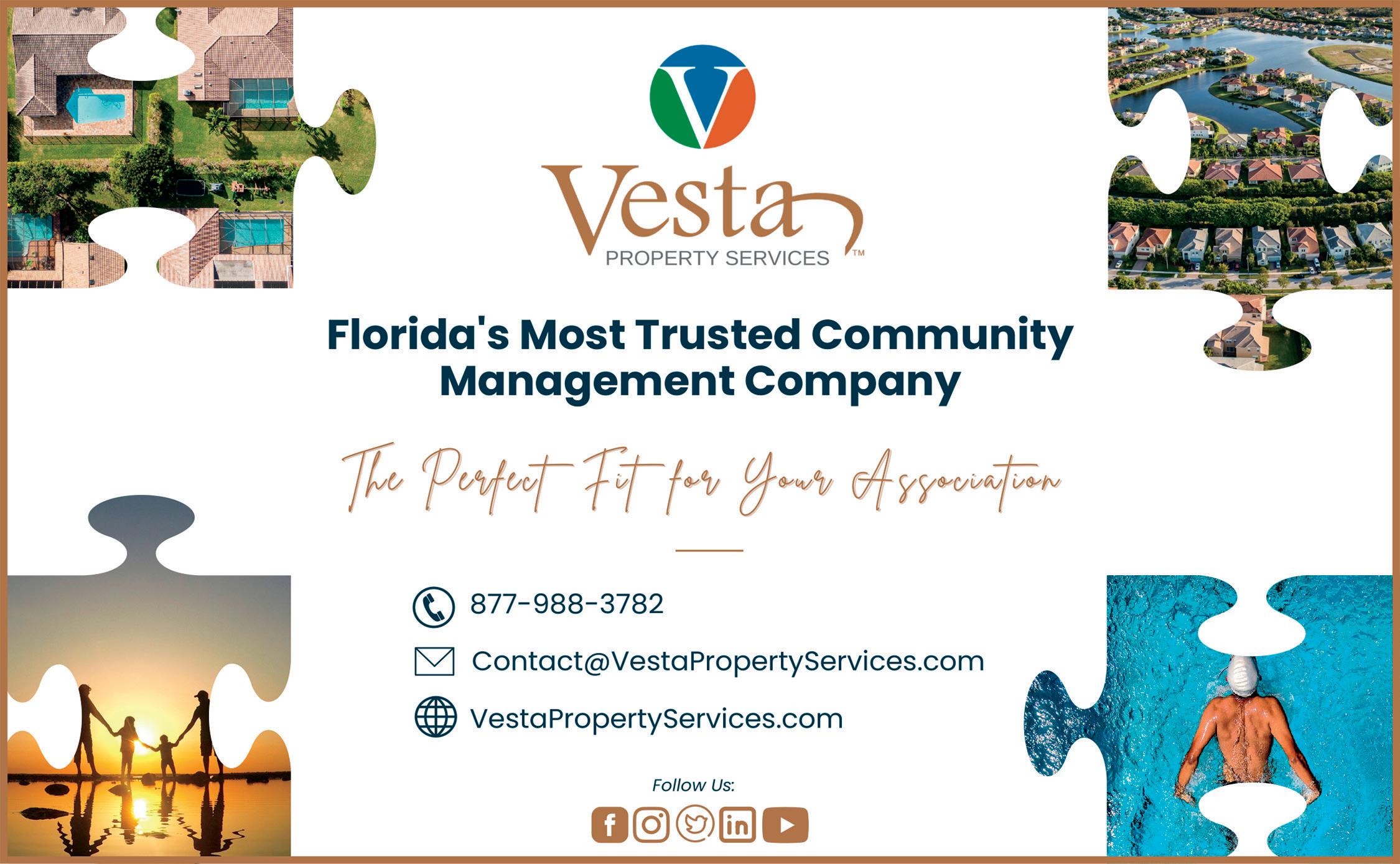
RECENTLY A FLORIDA APPELLATE COURT RULED THAT AN INSURANCE COMPANY WAS LIABLE FOR THE COSTS OF TEARING OUT PARTS OF A HOME TO ACCESS THE LEAKING PIPE EVEN THOUGH THE INSURED’S REPAIR CONTRACT COULD BE CANCELLED BY THE INSURED AT ANY TIME.
“incur” the tear out costs.
The trial court granted summary judgment for the insured, rejecting the insurer’s argument that the insured did not “incur” the tear out costs where the insured entered into a repair contract that the insured could void at any time.
The Florida appellate court agreed with the trial court’s decision in favor of the insured. “[T]he plain meaning of ‘incur’ as used in State Farm’s policy does not contain even a hint that an insured’s contract must be non-voidable before payment will be allowed,” the court stated. “State Farm’s interpretation simply adds an undisclosed requirement that the policy language does not support.” The court concluded that the insured did not have to actually expend funds on a loss to be entitled to insurance proceeds. As the court asks, why would an insured commit to a costly non-voidable contract if the insured is on the hook entirely if the insurer fails to pay for losses?
Of course, if an association sustains damage to its property, the association not only needs a written repair contract but also should be able to cancel the contract at any time if the insurer fails to pay a claim for damages. It is important to read and understand what is in your insurance policies.
DESTROY
Not only are leaking pipes a common problem, but South Florida



has seen our fair share of hurricanes in recent years. A roof needs immediate attention when damaged. Is there such a thing as repairing a roof too fast? Have you contacted your insurer so that the insurer can inspect the roof before you start the repairs? To avoid a spoliation of evidence defense, it is important to allow your insurer time to inspect the roof, as can be seen by the following decision.
In another recent insurance case, a Florida appellate court ruled that the insurer did not intentionally destroy evidence when it had repairs done to two buildings that were damaged by Hurricane Irma. The facts in Universal Insurance Company of North America v. Sunset 102 Office Park Condominium Association, Inc. , 48 Fla. L. Weekly D 2329 (Fla. 3rd DCA, December 13, 2023), reveal that after the association filed an insurance claim for hurricane damages, the insurer found that the damages did not exceed the deductible. The association then sued the insurer for breach of contract.
Prior to trial, the insurer maintained that the association intentionally destroyed evidence by fixing two of the buildings and sought a sanction for spoliation, that is, an “adverse inference” jury instruction. The trial court denied the motion for sanctions, finding that the insurer had inspected the property four times. Following a jury verdict in favor of the association, the trial court denied the insurer’s motion for a new trial and entered final judgment in the amount of $884,371.90.
The Florida appellate court affirmed the trial court decision. The court pointed out that the insurance policy required that the insured must allow inspection of the property “as often as may be reasonably

required.” However, the insurer did not establish that the association violated its duty under the terms of the insurance policy to preserve the evidence. “[T]he evidence supports the court’s determination, because Universal was allowed to inspect the property four times and did not request to conduct further examination of the two reroofed buildings—despite notice of Sunset’s intention to replace the roofs—until after installation of the new roofs was complete.”
Even though the association in this case was found to have not violated the insurance policy, the case highlights the importance of giving your insurer notice of a claim and having it inspect the property before undertaking any repairs. n



Editor’s Note: The following best practices are provided to help board members in HOAs save themselves from spending extra money, compounding their association’s problems, or wasting their valuable time. Though this counsel can’t cover every scenario, FLCAJ trusts what is covered will be of beneficial use.
When it comes to installing a new roof system, here are a few highly important points to remember.
1. Only accept a manufacturer materials and labor (single source) warranty since contractor warranties are worthless if the contractor goes out of business.
2. Only accept a roof system that has a manufacturer CAT 5 hurricane wind warranty since your deductible is five to seven percent, which means that you are “self-insuring” your roof system; and you should only install a roof system capable of withstanding the strongest hurricane. Only the spray polyurethane foam (spf) roof system has this CAT 5 hurricane warranty, and all other roof system warranties are void in a named storm in excess of 110 mph. Be smart—we live in a high-velocity wind zone.
3. Only accept a “true, fully tapered” roof system. The Florida building code only specifies that a re-roof has positive drainage without specifying the roof slope. Watch out!
For more information about Cool Roof Foam and Coatings, call 877-354-3626 or 954-788-1140 or visit www.coolroof.biz.
 By CSW Structural Engineers
By CSW Structural Engineers
Did you know it is now mandatory to retain a qualified professional to determine the safety of your building by performing a milestone inspection if your building is 25-years old for coastline properties and 30-years old for others?
Are you prepared for the new statute that requires condominium associations and homeowners’ associations to have a structural integrity reverse study (SIRS) completed by year end 2024 for implementation starting in 2025?
The SIRS must also be completed every 10 years, with each required milestone building in the condominium association or HOA requiring a safety or recertification inspection.
When choosing a provider, it is important to select a licensed professional who knows Florida’s building codes, understands building safety, and can recommend cost savings to preserve the longevity of your building.
Don’t delay, request your quote early!
For more information on CSW Structural Engineers, call 954-316-9001, or visit www.cswsg.net.

Insurance changes in the State of Florida have made commercial and residential customers in urgent need of updating their roofs to the highest standards. Commercial roofing projects have unique challenges. Businesses and condominiums have liability issues surrounding their structures. They keep the business and its capital equipment intact as well as keep the workforce,



Covenant
Covenant amendments
Contract review/negotiation
Collection of assessments
Meeting package preparation
Attendance
Legal counsel on all day-to-day
Review and negotiation of loan/line of credit documents
General litigation
Chapter 558
Negotiating
All
clientele, or residents safe and comfortable. Residential roofing repairs should be part of a comprehensive maintenance program that protects the long-term value of your home and your possessions. Roof repairs—either small patching jobs or major repairs—or replacement should follow a detailed inspection to identify areas that need immediate repair or replacement, and areas that are close to failing. This type of inspection is especially critical following storms that bring high winds, water, and flying debris.
Dan Tennis Roofing uses an inspect-identify-repair model to ensure comprehensive roof care for all types of residential roofs.
For more information about Dan Tennis Roofing, call 954-485-7778, email info@dantennisroofing.com, or visit www.dantennisroofing.com.

At Floridian Management Group our licensed property managers understand landlord-tenant laws and fair housing laws, which can help you avoid potential lawsuits and save time, money, and energy in the long run.
Landlords are required to maintain a proper residence for tenants (F.S. 83.51), including following all local health and safety codes and criteria determined by the Florida government as well as any regional or

| www.fcapgroup.com
local policies that apply to providing a habitable property.
The cost of hiring a licensed property manager to handle the day-to-day affairs for your rental is minimal with Floridian Management Group and allows the owner of the property to be free from the drama. We take care of everything! Our owners receive monthly financial statements, year-end reports, 24/7 tenant support, tenant online maintenance portal, monthly rent deposits, excellent communications between all parties, event notifications, a designated property manager, eviction management, renovations, maintenance/janitorial, and more.
For more information on Floridian Management Group, call 772-777-1171 or visit www.
FloridianManagement.com

Maintaining your stormwater infrastructure is vital to your community’s health and safety. Annual pipeline cleaning and inspection can help avoid catastrophic failures that result in undermining and future collapses of roads, driveways, and fairways within your property. Hinterland Group specializes in helping clients budget for the most cost-effective repair methods that won’t break the HOA reserves. Our trenchless technologies offer the smallest above-
ground footprint, meaning they are minimally disruptive to foot and vehicle traffic while extending the pipeline’s life expectancy another 50–75 years.
Please reach out to Jack Crowe, with Hinterland Group at 561640-3503 or jcrowe@hinterlandgroup.com for additional information on our infrastructure repair services.

There has been a big push in recent years to keep pace with the changing world. This is especially true when it comes to how technological advances change the way that communities are run. Your community’s access to technology may make residents feel like they are dealing with robots or stuck in the Stone Age. What would be considered a good mix? Here are three must-have features for every community:
• Multiple ways to pay your HOA/condominium dues online with ACH and/or a credit card.
• Multiple forms of communication from the board or management via text, email, online work orders, or by phone.
• An online portal with important information like governing documents, forms, community events, and information.
Shaun Patterson is president of Jilsa Management LLC, a leading provider of virtual management and back office and accounting services to Florida communities. For more information call 561-544-1122 or visit www.jilsamanagement.com.

No Charge Services
• Inspection
• Testing
• Diagnostics
• Consulting
• Custom design
• Education
Contract Services
• Waterproofing
• Painting
• Window sealants
• Caulking
• Green cleaning
• Metal roof refinishing
When you are addressing the refinishing needs of your communities and you seek a long-term property value increase, then call us first!
Lamphier & Company is a one-stop sustainability solution for the following:
We evaluate your project, write a proprietary scope of work choosing the best products, and use proper application techniques. This successfully proven process extends the painting cycle and yields a much higher return on investment.
We do not hire subcontractors and use only our full-time, uniformed employees who have passed Level II background checks through the FDLE and FBI.
As a state-certified general contractor and state-certified roofing contractor, we have been in business since 1965 and have over 39 years’ experience standing behind our work in Florida’s tropical environment.
For more information about Lamphier & Company, call 407-330-1628 or visit www.lamphier.com

We are MMA, the largest insurance brokerage in the world, and we take pride in serving Florida’s vibrant community associations. With over 200 years of combined experience dedicated solely to Florida’s community associations, our team understands the unique challenges and needs of these communities.
Our expertise lies in providing valuable advice and guidance to ensure the smooth operation and long-term success of your association. We recommend regular policy reviews, keeping up with market-changing terms to ensure your association is adequately protected.
Additionally, maintaining up-to-date association documents, including appraisals, wind mitigation reports, and roof reports, is crucial for
effective planning and risk management.
At MMA we believe in the power of collaboration. That’s why we encourage you to confide in our insurance specialists who can help you navigate the complexities of insurance planning around these important documents. By working together, we can ensure your association is well-prepared for any unforeseen circumstances and can continue to thrive.
Trust MMA to be your partner in safeguarding your community association's future. Contact us at michael.cutrone@ marshmma.com or visit our website at marshmma.com to learn more about our comprehensive services.

Congratulations on becoming or remaining a board member. This exciting opportunity is fulfilling but can be frustrating and overwhelming if you don’t have the right support. Of course, the vendors that take care of and maintain your property and structures are vital. However, almost all past board members will tell you that your property management company and your attorney are key to running an efficient administration. Find a property management company that is highly recommended by other boards. The property manager is your conduit to the attorney for day-to-day issues. Also, find an attorney with an association-based firm and a reputation for prompt responses, effective communication, successful collections, and valued counsel. The most important ability your attorney has is availability. I hope you consider The JD Law Firm as I handle all matters personally and have since the firm’s inception. I hope to be “Your Association’s In-House Counsel.”
For more information, call 407-864-1403, email Jeff@TheJDLaw.com, or visit www.TheJDLaw.com.



Yardi Breeze Premier is a small business owner’s best friend, making it easier than ever to manage condominiums and homeowners’ associations. It's all about making work more efficient, from keeping the books to making sure maintenance is assigned and completed. Breeze Premier is a cloud-based solution, which better protects your data and eliminates the need to update your own servers or perform IT maintenance. Simplicity is the name of the game, and Breeze Premier will help your business thrive and survive in any economic situation, requiring fewer resources to get more done in less time—all while getting you the most out of every dollar.
• Automate leasing , accounting, maintenance, and communication
• Streamline workflows by working from a single source of truth
• Protect sensitive data with Yardi’s secure, cloud-based servers
• Simplify operations with automated features such as online rent collection and violation tracking.
For more information on Yardi Breeze, visit info.yardibreeze.com/ associations. n





The Reser ve S tud y, Milestone Ins pe ct ion
& Insurance A pprais al E x per t!
Wi th over 25 year s of ex perience wi th reser ve studies and insurance apprais al, we ser vice condominium associations , homeowner associations , businesses , clubs , and organizations . Let a team of ex per ts and quali t y customer ser vice provide you wi th solutions and strategies you are looking for.
• S truc tural Integri t y Reser ve S tudies (SIR S)
• Tradi tional Reser ve S tudies
• Insuranc e Appraisals (Replac ement Cost Valuations)
• Milestone Inspe c tions
• Florida-base d and Family owne d
Go to our websi te to download your FREE copy of A nastasia’s new book!
Please cont act us to discuss how we can be of ser vice to your association!
“By failing to prepare, you are preparing to fail.” — Benjamin Franklin


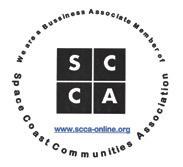


Florida Community Association Professionals’ (FCAP) training is offered on two levels. Level one consists of courses meeting Florida’s continuing education requirements for CAMs, and level two is the Florida Advanced CAM Studies (FACS) course. For further information about the more than 31 online continuing education classes available or to pursue the Certified Florida Community Association Manager (CFCAM) designation, please visit www.fcapgroup.com/membership/education-training/ .
 Betsy Barbieux
Betsy Barbieux
Lawrence,
Betsy, Is the CAM permitted to process and count the election ballots? The chairman says I can’t be involved in the election process. She doesn’t even want me to have the locked ballot box in my office. The DBPR election brochure says only the current board members, candidates, and their spouses cannot be involved in counting.
- LawrenceThere is no law as to the CAM duties for the election gathering/ counting process. As a CAM I want to be in charge of the whole process to make sure it’s done right!
For other CAMs I would ask, what does your management contract or employment agreement say? What are you contracted to do?
Both the statutes and Florida Administrative Code give good directions on the process as does the DBPR election brochure. All CAMs and election committees should be thoroughly informed of the correct procedures instead of “this is the way we have always done it.”
There is also a CAM Matters™ show on elections at www.youtube.com/watch?v=Z1bU1Aj57cY&t=35s .
As the CAM you are probably the safest person to handle the incoming ballots and oversee the ballot counters.
- BetsyBetsy, Do you have any “meet the candidates” questions you could share?
- BryanBryan,
Here are a few questions—
Please state your name and address and how long you have lived at ABC Association. And even though a lot of you know each other, what
is something everyone might not know about you?
In a Florida community association, the buck stops with the board, and the board members are managing millions of dollars’ worth of value. That places each of you in a fiduciary relationship with the owners. Have you then become familiar with the laws by which you must operate the association, and have you read and become familiar with your governing documents?
ABC Association board members are active in the operations and maintenance of the association. Have you been an ABC Association volunteer in any capacity, and if so, what did you do?
Because ABC Association board members are actively involved, that includes staying informed and being prepared for the board meetings. Are you willing to devote whatever time is necessary to prepare for board meetings, complete the action items assigned to you, and fulfill the other duties of your position?
In a similar way, ABC Association board members are expected to act as a team so that when decisions are made everyone is on board. Once the decision is made, how difficult will it be for you to set aside your personal opinion about
the action taken? Or will you be able to set aside taking credit for the decision?
One of the responsibilities of the board members is to enforce the restrictions on the owners’ use rights of their property. Are you willing to address a violation by your friends or neighbors?
Five or so years ago, ABC Association had almost all of its reserves embezzled. The board members since that time have worked hard to take the community into a stable position by implementing new processes and procedures. How open are you to considering and implementing new ideas for maintaining fiscal responsibility?
Do you realize the statutory mission statement for the board of directors is to protect the value of the property, maintain the common elements, and enforce the restrictions on the owners’ use rights? Board members in a community do not serve the wishes of the people. Yes, you listen to their concerns, but the laws and documents dictate your decisions. Will it be hard for you to stay focused on the mission statement rather than the people?
When an owner asks your opinion about something they want to do, that owner believes your personal opinion is official permission from the board, which it is not. How difficult will it be for you to tell that owner to put the question or request in writing and submit it to the manager?
What do you like best about ABC Association? If you could change one thing, what would it be?
- Betsy
Community association boards of directors and managers should educate themselves about several key aspects of OSHA (Occupational Safety and Health Administration) requirements for their properties and people.
Here are some important areas to focus on:
OSHA Standards—Understand the general OSHA standards applicable to community associations, including the requirements for maintaining a safe and healthy work environment for residents, employees, and contractors.
Hazard Communication—Ensure compliance with OSHA’s Hazard Communication Standard (HCS), which involves properly labeling hazardous chemicals, providing safety data sheets (SDS), and training employees on chemical hazards and safe handling procedures.
Material Safety Data Sheets (MSDS)—These sheets are documents that provide detailed information about the potential hazards, handling, storage, and emergency procedures for substances or products. MSDSs are typically used in workplaces where hazardous materials are present, such as manufacturing facilities, laboratories, or construction sites.
MSDSs contain essential information regarding the physical and chemical properties of a substance as well as its potential health effects, fire and explosion hazards, reactivity, and proper handling and storage practices. They also outline appropriate first aid measures and spill response procedures.
MSDSs are important resources for workers, emergency responders, and those responsible for managing hazardous materials to ensure safety and compliance with regulations.
It’s worth noting that the format and naming of these sheets have been updated in recent years. The newer term for MSDS is SDS (Safety Data Sheet), which is part of the Globally Harmonized System of Classification and Labeling of Chemicals (GHS).
SDSs follow a standardized format and provide comprehensive information on the safe use, handling, and disposal of hazardous substances. All cleaning supplies and chemicals should include these.
Contractor Safety—Implement procedures to evaluate the safety performance of contractors and ensure they comply with applicable OSHA standards on your property. This could entail reviewing contractor safety programs,
verifying insurance and licenses, and incorporating safety requirements into contracts. It is crucial to ensure that your architectural review board forms clearly outline these requirements.
OSHA Inspections and Citations—Understand the rights and responsibilities of community associations during OSHA inspections, including how to respond to citations and penalties. Familiarize yourself with the process of contesting citations if necessary.
OSHA Resources— Stay updated on OSHA regulations, guidance documents, and resources specific to community associations.
OSHA’s website provides valuable information, including compliance assistance materials, e-tools, and training resources.
Remember, it is always advisable to consult legal professionals or safety experts who specialize in OSHA compliance to ensure accurate interpretation and implementation of OSHA requirements for your specific property.
When performing safety inspections as a community association manager, it is important to comply with the regulations set forth OSHA. There are several key areas and factors to consider, such as the following:
Hazardous Conditions—
Identify and address any hazardous conditions that may pose a risk to residents, visitors, or workers. This includes potential slip, trip, and fall hazards; unsecured or unstable
structures; damaged walkways; or other physical hazards.
Safety Equipment— Ensure that the appropriate safety equipment is available and properly maintained. This may include fire extinguishers, first aid kits, and personal protective equipment (PPE), such as gloves or safety glasses, as well as signage indicating the location of safety equipment.
Emergency Preparedness— Evaluate emergency preparedness measures, such as emergency evacuation plans, exit signage, and proper functioning of emergency lighting systems. Also, check that fire alarms and smoke detectors are in working order, and conduct regular drills to ensure residents are familiar with emergency procedures.
Electrical Safety— Inspect electrical systems for any potential hazards, such as exposed wiring, overloaded circuits, or faulty outlets. Ensure that electrical panels are properly labeled, and electrical equipment is maintained and grounded. You may want to consider conducting a thermal imaging scan of all electrical components.
Pool and Recreational Facilities— If your HOA manages amenities like swimming pools, playgrounds, or fitness centers, inspect these areas for compliance with safety regulations. Ensure that pool gates and fences are secure, playground equipment is well maintained and not posing any safety risks, and exercise equipment is in good working order.
Chemical Storage and Handling— If there are any chemicals stored on the property, ensure they are properly labeled, stored in appropriate containers, and handled according to proper guidelines. This includes cleaning agents, pool chemicals, or any other hazardous substances.
Recordkeeping— Maintain thorough records of safety inspections, including the date, findings, corrective actions taken, and any followup needed.
Keeping accurate records demonstrates compliance with safety regulations and helps track progress over time. Rely on your experts for guidance and information regarding safety for all components on your property.
It is essential to familiarize yourself with the specific OSHA regulations applicable to your jurisdiction.
Additionally, consulting with a safety professional or seeking guidance from OSHA directly can provide further assistance in understanding and meeting the necessary compliance requirements. Florida has multiple OSHA area offices located throughout the state. These offices are responsible for enforcing OSHA standards and conducting inspections. You can contact the OSHA area office that covers your location to seek guidance on compliance by visiting www.osha.gov/ contactus/bystate/FL/areaoffice .
It’s important to note that OSHA compliance and regulatory
requirements can vary depending on the nature of your property or operations. Consulting with a professional in the field or reaching out directly to OSHA or their designated representatives can provide you with the most accurate and upto-date information regarding compliance on your property.
When it comes to safety precautions and hazards, community association managers may consider the following precautions. The following are a few examples of best practices:
Educate and Train—
Provide comprehensive training programs and workshops to residents and staff members regarding OSHA regulations, environmental hazards, and safety protocols. This will help raise awareness and ensure everyone understands their responsibilities and how to prevent and mitigate any hazards or risks.
Conduct Risk Assessments— Regularly assess potential hazards within the community, including physical infrastructure, common areas, storage facilities, and residents’ storage lockers and all workspaces. Identify areas where OSHA regulations or environmental hazards may be relevant, such as chemical exposure, ergonomic concerns, electrical safety, or slip-and-fall risks.
Develop Safety Policies—
Establish written safety policies and procedures that comply with OSHA standards and address environmental hazards.
These policies should cover topics such as emergency response plans, personal protective equipment (PPE), hazardous material handling, and incident reporting protocols.
Provide Adequate PPE— Ensure that appropriate PPE is available and accessible to all members and staff. This may include items such as gloves, safety glasses, hard hats, respirators, vests, or hearing protection, depending on the specific hazards present in the community. Ensure all eye wash stations on the property are equipped and filled. Have a well-stocked, commercial-grade first-aid kit on hand.
Perform Regular Inspections— Conduct routine inspections of community facilities, equipment, and work areas to identify any potential hazards or safety violations. Walk the property regularly. Promptly address any issues that are discovered, and document corrective actions taken.
Establish Communication Channels— Implement effective communication channels to disseminate safety information, updates, and reminders to all members and staff. This could include newsletters, bulletin boards, websites, email notifications, or digital platforms.
Encourage Reporting— Encourage members and staff to report hazards, incidents, or near misses promptly. Establish a confidential and non-punitive reporting system that allows individuals to raise concerns without fear of reprisal. Investigate reported incidents thoroughly and take appropriate corrective actions.
Engage Professionals— Seek guidance from OSHA consultants, environmental experts, or safety professionals to conduct audits, provide training, or offer recommendations for improvement. These experts can help identify potential hazards and suggest effective control measures.
Stay Updated with Regulations— Regularly monitor OSHA and environmental regulations to ensure compliance. OSHA frequently updates its standards, so it's crucial to stay informed about any changes that may affect the community association.
Foster a Safety Culture— Promote a culture of safety within the community association by encouraging active participation, recognizing safety achievements, and rewarding adherence to safety protocols. Regularly reinforce the importance of safety through meetings, training sessions, and reminders.
Community associations can take several steps to protect their members and staff from occupational and environmental hazards. It is critical to consult with legal and safety professionals who specialize in OSHA and environmental regulations to ensure that your community association meets all legal requirements and best practices to protect the health, safety, and welfare of your community.

Virginia Hertel was born in Denver, Colorado, and grew up in Cleveland, Ohio. Having later moved to South Florida, she attended Broward College for her associate in science degree in nursing. After three years of working as a private duty nurse, she decided to change her career after witnessing a fire at a condominium complex. The devastating event made her realize that she could be more impactful by helping to prevent these tragedies from happening in the first place. On January 21, 2019, she received her CAM license. Shortly thereafter she was hired to manage a 280-unit condominium in Broward County, which has been her home for the past five years.
Seeking the CFCAM designation was important to her because of her desire to gain
knowledge, advance her career, and stay up to date on Florida industry-specific information.
She sees a couple of challenges to the community associa tion industry. The first major issue or challenge facing commu nity association managers in 2024 is proper budget preparation con sidering new State statute require ments. Many associations in Florida are quickly learning that they are going to have to fund reserves, which is leading to ris ing costs for homeowners and antagonism toward the manage ment team. The second major issue is safety.
The professional achievement that she is most proud of is hav ing a direct impact on leading several electrical modernization projects, which have reduced the risk of fires. All the hardworking volunteer board members who make this career possible have had the biggest influence on her.
During her free time, she can usually be found with her
11-year-old daughter, her spouse, and their dog Sadie enjoying life in Coconut Creek, FL. n















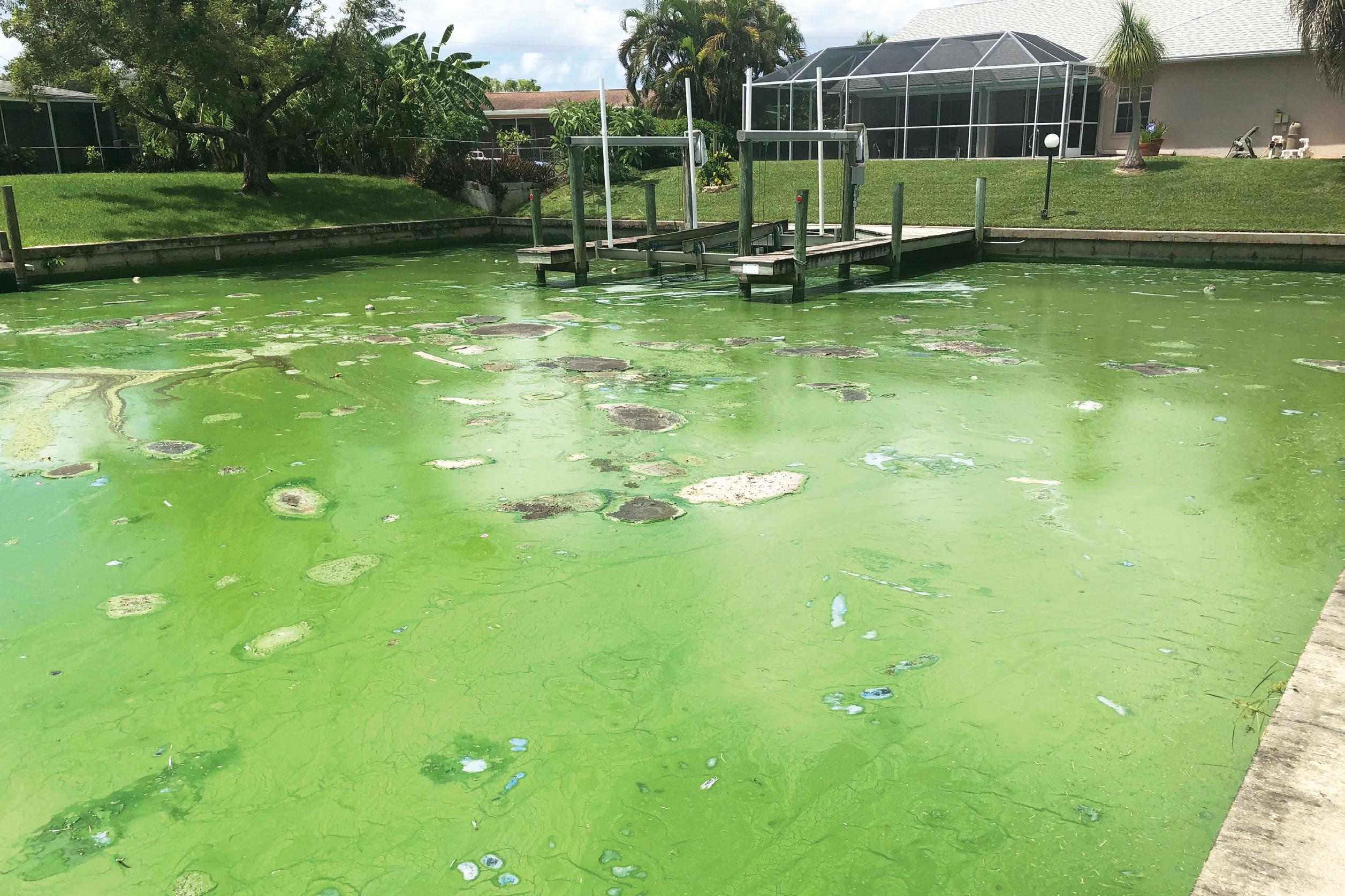 SOLitude Lake Management
SOLitude Lake Management
Most community waterbodies are man-made to prevent flooding and capture pollutants by collecting and filtering stormwater runoff. They can also offer aesthetic allure and recreational advantages, which may contribute to increased property values and community desirability. Despite these benefits, community waterbodies can present substantial risks if not properly managed. Eroded shorelines may collapse, posing dangers to residents and landscapers. Nuisance weeds contribute to physical hazards in the water, while muck and debris can obstruct stormwater equipment, elevating the risk of flooding and damage to community infrastructure. However, one of the most significant threats—algae—often goes overlooked.
Algae found in freshwater generally fall into two categories: filamentous algae form dense, slimy patches; planktonic algae have a dye-like appearance. Some species of planktonic algae, like cyanobacteria, can form harmful algal blooms (HABs).
Also referred to as blue-green algae, cyanobacteria are capable of producing toxins that can be harmful (and in some cases deadly) to fish, birds, livestock, and other mammals. Sadly, reports come out each year of dogs dying after exposure to cyanotoxins through swimming in or ingesting contaminated water. Toxins can also become airborne, exposing both humans and animals to contaminated air droplets. This airborne exposure can lead to irritation of the eyes, nose, throat, and lungs.
While there is currently no
Everyone wants a beautiful lake but it’s not always easy, which is why SOLitude uses science-backed solutions to take care of algae, weeds, and other lake issues so you can avoid the frustrations and enjoy clean water. SOLitude’s team of aquatic scientists specialize in providing customized lake, stormwater pond, and wetland and fisheries management programs. Services include water quality testing and restoration, algae and aquatic weed control, installation and maintenance of fountains and aeration systems, shoreline erosion control, muck and sediment removal, and invasive species management. Contact SOLitude at 855-534-3545 or visit solitudelakemanagement.com
evidence indicating HABs are life-threatening to humans, their harmful effects cannot be understated. Exposure to cyanotoxins may result in a range of adverse effects, including vomiting, headaches, stomach aches, diarrhea, muscle weakness, dizziness, slurred speech, and liver damage. According to the Centers for Disease Control (CDC) and Prevention, there may be a link between prolonged toxin exposure and the development of neurological diseases, such as Alzheimer’s, Parkinson’s, and Amyotrophic lateral sclerosis (ALS).
The CDC reports that there is no specific diagnostic test, antidote, or treatment for cyanotoxin exposure beyond management of the symptoms.
Like any form of algae, HABs typically develop in waterbodies that contain elevated nutrient levels. The combination of abundant sunlight and high


Is your once-scenic lake caught in an ongoing battle with algae and weeds? Break free from the endless struggle by partnering with experts who understand the frustration of dealing with these persistent issues. Say goodbye to the stress that comes with algae and weeds, and say hello to a revitalized and healthy lake your residents can enjoy year-round.

temperatures facilitates photosynthesis, making mid to late summer the prime time for HAB occurrences. Cyanobacteria consume substantial amounts of dissolved oxygen (DO). In the event of a large bloom, rapid depletion of DO exacerbates the stress on fish and other aquatic organisms.
Evidence suggests that HABs are occurring more frequently. In recent times there has been a notable upward trend in average summer temperatures, especially in northern states. Runoff from roadways, urban developments, and agricultural land; lawn fertilizers; sewage; and other pollutants introduce abnormally elevated levels of nutrients into our waterbodies, amplifying the conditions that fuel HABs.
Cyanobacteria blooms often appear as blue, bluegreen, or “pea soup” green scum that resembles oil or spilled paint on the water’s surface. In some cases they can also appear red, brown, white, or gold. They may accumulate in specific areas of a waterbody due to wind or water currents, and multiple toxic blooms may occur simultaneously. Likewise, smaller or shallower ponds have the potential to form concentrated toxic zones.
A cyanobacteria bloom and the presence of toxins must be confirmed through professional water quality testing. Not all cyanobacteria blooms release toxins, but recognizing the signs is pivotal to protecting residents, employees, pets, and wildlife from potential harm.



If urgent management is necessary, professionals may apply an EPAregistered algaecide in an attempt to rapidly eliminate the bloom. However, toxins can be released during die off. Even when cyanobacteria are no longer visible, there is no reliable way to remove toxins from the
water. Managing HABs when toxins are present is challenging and may not always yield the ideal results. The most responsible way to keep humans and animals safe from cyanotoxins is through prevention.
An ongoing lake management program equips community leaders with proactive solutions to keep a close eye on the environmental conditions and detect imbalances that signal a bloom may be imminent. Water quality testing, nutrient management, fountains and aeration, and shoreline vegetation maintenance are central to a proactive water quality management program. And if serious water quality or shoreline issues do arise, aquatic experts can implement more extensive solutions like shoreline restoration and depth restoration to help improve water health and community safety.

Homeowners and staff also play an important role in preventing water quality imbalances. Remind residents to properly dispose of pet waste and trash. Ask landscapers to bag grass clippings and lawn debris and limit the use of fertilizers. These small efforts can prevent excess nutrients and bacteria from entering nearby waterbodies.
While pond aesthetics are important, the well-being of residents should always take precedence. Property managers hold the keys to both. Through proactive strategies, collaboration with experts, and a steadfast commitment to ecological balance, stakeholders can work together to cultivate clean, beautiful water bodies that enhance quality of life and elevate the desirability of their communities for years to come. n





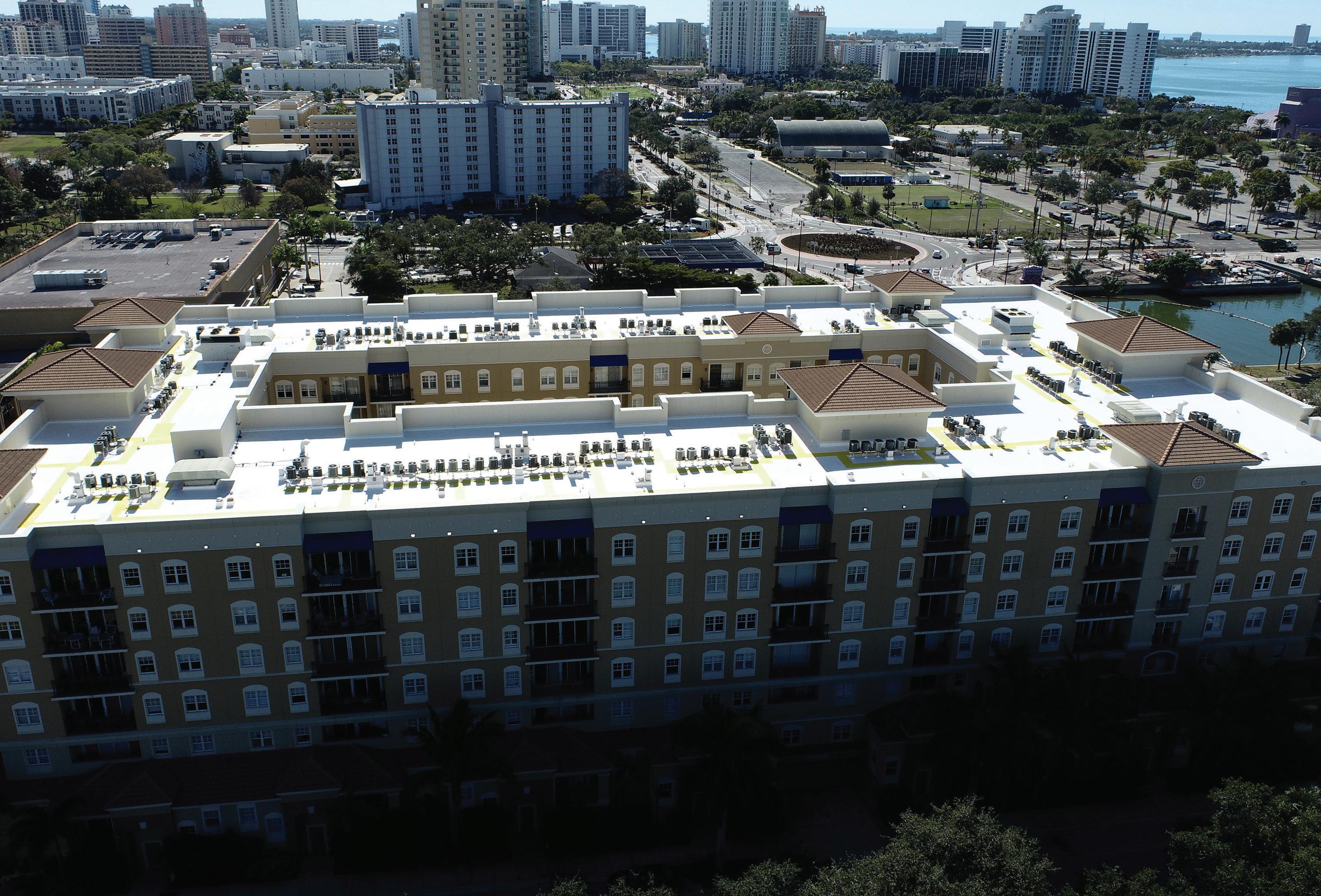
hen it comes to building maintenance, property managers don’t often think much about the roof. Unfortunately, the roofing system is out of sight, out of mind until there is damage or some other problem that sounds the alarm about a needed repair—or worse, the roof needs replacement. A building’s roof wasn’t cheap to install and will likely be even more expensive to replace. With that in mind, here is a brief guide on ensuring your roof is maintained correctly to avoid an unexpected and overwhelming business expense. This article provides eight roof maintenance best practices guaranteed to help you limit unexpected expenses and ultimately extend the life of your roof.
1. Take the time to inspect your roof monthly or quarterly, as well as after severe weather. A property manager deals with many distractions and responsibilities on a daily basis, and it can be easy to put off routine roof inspections. But the best way to avoid costly repairs is to catch a problem when it first manifests so that you can deal with it before it expands or spreads.
2. Repair minor cracks or unsealed areas before heavy rain can penetrate the structure. Even the smallest amount of water intrusion can cause significant damage over time, so sealing up any breaches early on is the best
Unicoat Industrial Roofing is a trusted contractor specializing in extending the life of your roof with various roof coating solutions. If you are looking for ways to maximize your budget and the life of your roof, call today to learn more about our services. For more information, call 800-510-7661 or visit www.unicoatroof.com
course of action. Many regions experience less precipitation during certain times of the year, making those times a window of opportunity to fix cracks or fissures without the risk of bad weather.
3. Limit who walks along your roof. Property owners often don’t realize just how damaging foot traffic can be to the roof’s surface. It is important to limit foot traffic on the roof to essential employees or contractors and to designate traffic patterns to minimize the risk of unintentional damage.
4. Identify and get to know reputable roofing contractors in your area. The best course of action is to form a relationship with a professional roofing contractor who is familiar with your roof, performs routine inspections and maintenance, and can be called in the case of an emergency. In areas prone to severe weather, having a


maintenance contract with your roofing contractor can ensure your company is at the front of the line after a regional event.
5. Seek out the sources of any wet insulation or watermarks. You have a leak if you notice that insulation is moist or matted down or there are water stains on interior ceilings, walls, or framing. It is essential to identify the source of the leak as soon as possible and have those leaks repaired before mold or infestation can wreak havoc on your building. These scenarios can also be detrimental to the building’s energy efficiency.
6. Investigate options for roof restoration to determine if there are more affordable methods to extend the life of your roof . We often cite the fact
that experts believe that most roof replacements were performed prematurely; that is, there were easier ways to fix and extend the roof’s usefulness. Roof coatings are an excellent option for many commercial building owners. Roof coatings affordably address the issues and can extend the life of the roof for decades.
7. Consider ways to lower energy costs over time. Roof coatings are also excellent for cooling the roof’s surface and saving on utility costs while making the roof watertight and protecting the structure.
8. Familiarize yourself with your roof warranty, including all terms, conditions, and exclusions. It is essential to understand what repairs and replacements are covered under your warranties and which are not so that you do not make purchases and expenditures unnecessarily. n
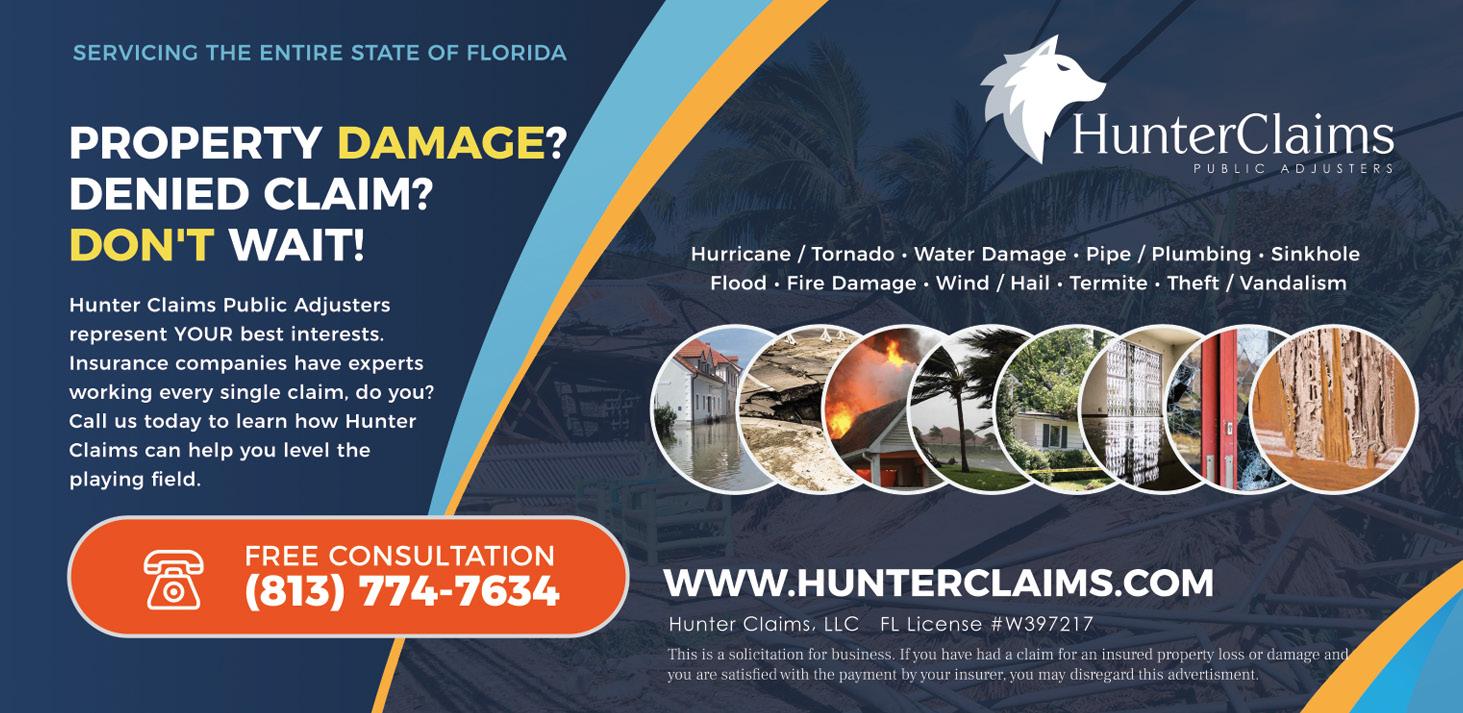


Spring break is a popular time for students to travel. Most destinations include great weather and access to beaches. With the growing popularity of short-term rental apps such as Airbnb, VRBO, and other platforms, some available locations are within homeowners’ associations. Unfortunately, these short-term visitors could create challenges for the residents living in HOA communities for many reasons. These challenges include excessive traffic, limited parking, and overcrowding of common areas such as pools and clubhouse facilities. While some are guests of residents, others are short-term visitors renting from HOA residents, allowing access to their homes for a
limited amount of time during spring break and summer. Short-term visitors may only sometimes be aware of the association’s rules and guidelines that are implemented to protect their community. It is crucial to consider the wellbeing of other residents living in the community during these periods and avoid any legal liabilities. Here are some ways to limit negative experiences with short-term visitors in HOAs.
Although short-term renters deal directly with the homeowner, HOAs should require additional approval from property management or board members involved in the decision-making process. Include background checks to ensure the applicant does not have a criminal background. Limit the bringing of weapons onto the premises, but first review local and state laws before implementing such rules to ensure there is no violation of the rights of an individual renting for a short time. Limit the number of people staying in the

Darion Samuels is Sr. HOA account manager for ADT Community Association Program. We have a dedicated team that works primarily for ADT HOA communities, providing world-class customer care and service to more than 100,000 residences through bulk agreements. This includes 24/7 monitoring by our own state-of-the-art monitoring centers and “concierge-level” customer care and service provided by our exclusive community association service center. Alarm systems feature interactive technology, high-resolution CCTV systems, and customized smart home solutions for HOA customers. For more information, contact Darion Samuels at samuelsd@adt.com or call 954-299-1000.





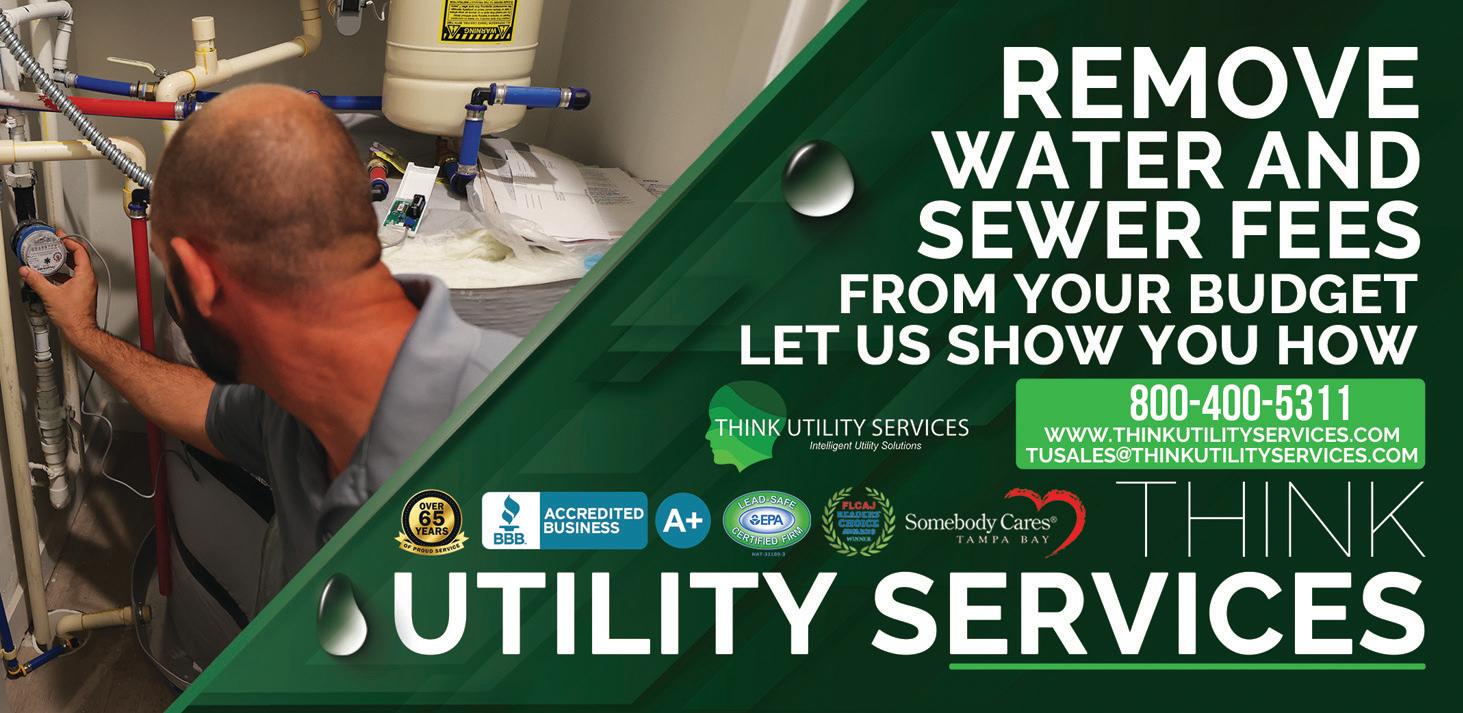



GRS Community Management commands a powerful impact in communities by leading the industry with professional excellence. Dedicated to creating and preserving the beauty and safety of your residential community. GRS o ers property management, nancial management, and gVault online document management system.


residence to avoid noise level and behavior concerns; this will help mitigate the negative impacts on the residents. Avoid violating the Fair Housing Act, which provides guidelines to HOAs to not enforce rules only against a protected class of individuals. Be sure all the rules that are enforced apply to everyone. It’s also essential to address any issues that may occur immediately and work towards a quick resolution.
HOAs can create rules and regulations for their community, but federal, state, and local laws take precedence over HOA rules; association rules should not contradict or violate these laws. As a homeowner you also reserve the right to set rules and guidelines for any tenant or guest to follow while staying on the property. Explain each rule and guideline in detail, and list the violation with each offense. Be sure to remain within the community rules and expectations regarding common areas, pools, playgrounds, and other parts of the property. All rules and guidelines should be agreed upon before the rental date.
Consider all parking rules mandated by the association. This helps reduce the fines that result from the violation policies implemented by the community. Limit the number of vehicles parked at the residence. Keep street parking to a minimum as this helps avoid blocking the driveways of other homeowners and creating a traffic nuisance.
Secure the exterior and interior of your property. Smart home technology has improved in many ways, and the interactive benefits provide remote access and monitoring control you can manage through a smartphone. Installing security cameras around the perimeter is a great solution to ensure the rules and guidelines are followed. Security cameras are also significant deterrents as most thieves avoid homes with surveillance devices installed. The ability to view live video and access recorded footage in real time is an excellent advantage for properties in HOAs. Smart door locks are another valuable device. Managing the codes and access of your shortterm renters allows access to the home without needing a physical key. One key benefit of smart door locks is code access programming, which allows adding and deleting assigned codes to ensure there’s no reentry without approval. Security systems offer a great deal of safety and a crime deterrent. Real-time alerts on all sensors are valuable for monitoring suspicious, unauthorized access. Complete control of the property provides excellent peace of mind, knowing the investment in smart home devices is helping to mitigate the negative impact of shortterm renters in the community.
Prioritize the residents living in the community to ensure there is little or no impact on their harmony. Successful management of short-term visitors in HOAs requires cooperation from both property owners and renters. n































































In the fast-paced environment of community association management, few individuals take the necessary time to effectively plan their finances and develop a budget for the upcoming year. Failure to develop and maintain a comprehensive annual budget can lead to unforeseen consequences down the road. Getting caught flat-footed in an industry that demands such transparency and swift response times can jeopardize your relationships with homeowners. From routine maintenance and vendor coordination to the critical task of properly funding reserves, community associations have a fiduciary responsibility to protect their homeowners, and it all starts with a robust financial strategy.
When it comes to developing a financial strategy, it’s never too early to start thinking ahead. The industry norm finds most associations developing budgets by the end of the summer, but the sooner (and longer) you can














•
•
•
The foundation of any successful banking relationship starts with the right partner, but not every bank has the capabilities and expertise to support your community association’s financial goals. These are some of the key characteristics your association should look for in a financial partner:
Availability— A common gripe in the association industry is that banks are often unresponsive or delayed in their communication. In light of this, our team at Cogent Bank has strengthened its commitment to hands-on, personalized banking. Community associations operate on quick turnarounds and short deadlines, and your banking partner should be able to match that sense of urgency. When identifying a bank for your association, make sure customer service is a priority.
Expertise— You should consider looking for a bank that specializes in banking for associations. A healthy relationship with your bank should not stop at a loan or transaction; a true banking partnership can provide your association with a variety of resources, knowledge, and support. Cogent Bank, for instance, has a seasoned team of professionals dedicated to association banking. Each member, including myself, has seen it all in our more than 75 years of combined banking experience within the communities of Florida and beyond.
Local Knowledge—A banking partner that understands the community you operate in adds
substantial value to your association. These institutions are equipped with the local expertise necessary to provide accurate, informed financial strategies. Given their invaluable local insights, among several other reasons, community banks often make excellent banking partners for community associations. My time with Cogent Bank has shown just how impactful having a bank with deep roots in the community can be. Not only does local knowledge provide a better understanding of local rules, legislation, etc., but also it helps to develop an incredible regional network of professional resources that we can refer our clients to. Being a part of the communities we serve means we understand your unique needs and how to best support you and your association.
Cogent Bank’s Association Banking vertical provides handson, personalized service to community associations across its statewide footprint in Florida, with banking centers in Fort Myers, Naples, Orlando, Winter Park, Orange City, Tampa, St. Petersburg, and Jacksonville. With
financing options including construction loans, term loans, emergency lines of credit, etc., Cogent Bank has a wide array of resources to service you. To learn more about the Cogent Bank and its range of services for associations, visit https://cogentbank.com/business-banking/industry-specialties/ association-banking/?utm_source=FLCAJ&utm_ medium=article&utm_campaign=banking_partner n




here are a lot of questions and misunderstandings that owners, board members, and CAMs have because they’re reading words that in our industry have a peculiar meaning or legal significance. And sometimes it is easy to read over a simple word and misunderstand the meaning of the whole sentence or paragraph—for example, the word “must” and the word “may.” Not paying close attention to those words can lead you down the wrong path.
Conversation and explanation are vitally important to reading with understanding. Studies have already shown that distance
learning is ineffective. That is because there is no conversation or opportunity to receive an explanation. So, it concerns me that with the online self-study CAM prelicensing and CE courses the CAM applicants and CAMs are not really learning anything. They are just doing the time to get the credit.
A situation that comes to mind is a group of owners who read the phrase, “10 percent of the members can call a special meeting for the purpose of recall.” They took that to mean that if they got six people, which would be 10 percent of their membership, to sign a piece of paper, the board of directors would be recalled. But that’s not what that means. It means that 10 percent of the membership may petition the board to schedule a special membership meeting for the purpose of recall with the appropriate notice, agenda, and the sending of the limited proxies. At the special membership meeting to recall, there is a statutory percentage of affirmative votes needed to recall the board member or members.
(Special note—the DBPR/ Division of Condominiums prefers the written agreement to recall rather than recall at a meeting.)
Reading without understanding can create a mess. That group of six owners continued to believe they had recalled the current board, appointed themselves as board members, changed the information on Sunbiz (which is a third-degree felony as provided in Section 817.155, Florida Statutes), opened a bank account, and told owners to redirect their monthly payments to them. This is stealing other people’s money. They finally contacted an attorney

Betsy Barbieux, CAM, CFCAM, CMCA, guides managers, board members, and service providers in handling daily operations of their communities while dealing with different communication styles, difficult personalities, and conflict. Effective communication and efficient management are her goals. Since 1999 Betsy has educated thousands of managers, directors, and service providers. She is your trainer for life! Betsy is the author of Boardmanship, a columnist in the Florida Community Association Journal, and a former member of the Regulatory Council for Community Association Managers. Subscribe to CAM MattersTM at www. youtube.com/c/cammatters. For more information, contact Betsy@ FloridaCAMSchools.com, call 352-326-8365, or visit www.FloridaCAMSchools.com.


who told them they had to give the money back to management. Then the bona fide board authorized the manager to correct the Sunbiz report and restore bona fide board members’ names.
In the above case, though fraudulently changing the Sunbiz information is a third-degree felony, it is so far down the food chain at the state attorney’s office that they’re not going to prosecute this group.


So, circling back, the whole reason for this story is to explain that if you don’t understand what you’re reading, the misunderstanding could lead to legal issues.
In the prelicensing course and the board certification training, the statement is made that board meetings are the business meetings of the corporation. That likely goes in one ear and out the other until it is explained that board meetings are the business meeting of the board members as opposed to an informational meeting for the owners. The board meeting is not an informational meeting for the owners. It is not a Q&A session. The board meeting is for the board to get its business done. It makes financial and contract decisions and deals with vendors, violations, maintenance, collections, and any other business. The board members have an obligation to protect the property and its value, maintain the common property, and enforce the covenants. Board members do not serve a constituency; they serve the governing documents and statutes.
Another misunderstanding is the development of the bud-

get, its purpose, and owners’ obligations. For community associations a budget is only a guide. Board members must spend whatever it takes to protect the property and its value, maintain the common property, and enforce the covenants even if it spends over the amount allocated for that budgeted item.
Community association budgeting is the opposite of the regular business world. The laws and documents require that the board of directors maintain the property and all the amenities just as the developer turned them over to you. That means the board must spend “whatever it takes” to protect the value of the property, maintain the amenities, and enforce the covenant restrictions. If the board needs more money than is budgeted, they can amend the budget and change the regular assessment payment or special assess the owners. When purchasers buying a unit, lot, or share sign the closing documents, they have pre-agreed to pay “whatever it takes” to meet the annual and future expenses of the association.
The goal of some board
members is to never raise the assessment amount due from owners. If the regular assessment amount does not go up every year, the board is likely not performing its fiduciary duty. Assessments should go up at least as much as the inflation rate.
In other words, association budgets are created differently than the regular business, corporate, social, or charitable organization. These other





organizations look at trends, market analyses, historical income, charitable giving, etc. and guesstimate their income. Then they fit their anticipated expenses under that income. When a budgeted line item runs out of funds, spending in that category is shut down. In community associations the calculation is opposite. The anticipated expenses are calculated first, and the total of those expenses will be the amount of income that is divided among the owners and paid to the association monthly, quarterly, or annually. If the association needs more money than budgeted for, the board is obligated to get that money from the owners. All expenses must be covered.
If you are not sure of the meaning of what you are reading, ask. n













Editor’s Note: FLCAJ would like to congratulate these four outstanding 2024 Readers’ Choice Awards winners! (For a full list of 2024 RCA winners, please read the March 2024 issue or visit www.fcapgroup.com/flcaj/readers-choice/

Diamond Level Winner—Lakes, Pools, and Outdoor (Winner 2024 and nine previous RCA wins)



Absolute Patio Furniture has been in the business of manufacturing commercial and residential outdoor furniture since 1984. Our collection of new furniture includes sling furniture, strap furniture, beach beds, umbrellas, tables, hand sanitizer stands, accessories, and more. We offer a wide variety of frame and fabric options, so browse our selection and customize a perfect new addition for your property.
Absolute Patio Furniture has proudly served South Florida and the Caribbean for 35-plus years. Our customer base includes commercial and residential properties (homes, apartment complexes, condominium communities, homeowner associations, hotels, theme parks, water theme parks, and resorts).
In addition to manufacturing our own furniture, Absolute Patio Furniture also offers patio furniture restoration services, which
includes powder coating frames and installing slings, vinyl straps, and cushions. Our dedicated patio furniture restoration division serves hotels, country clubs, HOAs, and private homeowners. Our restoration process takes place in our 30,000 square foot facility in Pompano Beach, FL, and involves sandblasting, chemical pretreatment, and two-stage powder-coating systems. We offer sling replacement, strapping services, and cushion/pillow replacement using Sunbrella fabrics. We are certified warranty refinishers for some of the largest furniture manufacturers in the country and are certified by the American Architectural Manufacturers Association (AAMA). If you’re not in the market for brand new furniture, let Absolute Patio refinish your furniture, transform your outdoors, and save you
money—your old patio furniture will be transformed and look brand new!
Visit our website absolutepatiofurniture.com . For a new quote call 954-419-3194 or email
tammy@absolutepowdercoat.com.
Diamond Level Winner—Safety and Security
(Winner 2024 and nine previous RCA wins)
Envera Systems is a dynamic security company that offers a wide range of technology-based solutions and services to communities, property managers, and residential developers. Envera’s goal is to provide cost-efficient and effective security solutions that manage access into a community or other areas and provide monitoring at those locations


through video surveillance or userfriendly data. Envera’s motto, “Access Your Life,” reflects the commitment to providing solutions that enhance the quality of life within a neighborhood.
One of Envera’s unique solutions is the Virtual Gate Guard, which is designed to greet and screen visitors at a gated entrance. This revolutionary access management system includes features that automatically verify repeat, authorized visitors by license plate, an ID, or a QR code. Guests who are not instantly verified speak with a trained Envera agent for processing. MyEnvera, the website and app, is included with this solution for residents and property managers to easily manage guest details.
Envera also offers a range of amenity solutions to help secure all areas of a community. The active video surveillance system is often employed to keep designated areas clear of trespassers after hours, saving communities extensive costs typically associated with damage and vandalism. This preventive solution connects monitored locations to Envera’s trained agents, who receive alarms if trespassing occurs. The agents can see and speak with anyone who has entered the closed location. Additionally, Envera provides access control solutions for doors, gates, and gated entrances, as well as

high-speed barrier arms to help mitigate tailgating.
With a state-of-the-art monitoring center and various supporting departments, Envera is exclusively capable to operate 24 hours a day, 365 days a year to provide assistance and support to customers. Access your life with a community security partner committed to understanding the needs of associations, affordable asset protection, and innovation.
For more information on Envera Systems, call 855-380-1274, email info@enverasystems.com, or visit www.EnveraSystems.com
Hotwire Communications
Diamond Level Winner— Technology and Communications
(Winner 2024 and seven previous RCA wins)


Established in 2002, Hotwire Communications is a pioneering telecommunications company based in South Florida and specializing in fiber-based solutions for TV, internet, and phone services. With a focus on multi-unit and multi-dwelling communities like condominiums, municipalities, and senior-living communities, Hotwire has been at the forefront of technological inno-
vation within the industry.
Setting itself apart as an industry disruptor, Hotwire was the first ISP in Florida to invest in an all-fiber network and offer fiber-to-the-home [FTTH] technology. In 2006 it further solidified its position by introducing internet protocol television (IPTV) services, followed by the rollout of gigabit-speed internet in 2014, demonstrating a commitment to pushing boundaries and exceeding customer expectations.
Today Hotwire Communications serves more than 1,100 properties nationwide, earning recognition for its exceptional service quality. PCMag honored Hotwire as the Fastest ISP in the Southeast U.S. in 2022 and the Fastest Gaming ISP in the Southeast U.S. in 2023. Also, Hotwire has received multiple Stevie Awards for outstanding customer service, most notably for Customer Service Team of the Year in a Recovery Situation for their response after Hurricane Ian.
Continuing to lead with innovation and customer-centric solutions, Hotwire Communications remains dedicated to providing reliable and cutting-edge telecommunications services.
For more information on Hotwire Communications, visit hotwirecommunications.com
Diamond Level Winner—Legal Services
(Winner 2024 and ten previous RCA wins)


Kaye Bender Rembaum, a ten-time Diamond Level Readers’ Choice Award winner from FLCAJ, is a full-service law firm dedicated to the representation of community associations throughout Florida. With offices in Broward, Palm Beach, Hillsborough, Orange, and Miami-Dade Counties (Miami by appointment), the Firm provides its clients with an unparalleled level of personalized and professional services that are prompt, effective, and understandable, regardless of the size of the community and taking into consideration their individual needs and financial concerns.
Led by a team of experienced attorneys, several of whom are boardcertified specialists in condominium and planned development law and one board certified in construction law, KBR assists clients in all matters of association representation, including the collection of assessments, contract drafting and negotiation, updating of governing documents, covenant enforcement, complex litigation, construction defect claims, and more.
Kaye Bender Rembaum attorneys remain active statewide, many with leadership roles on statewide committees that work to improve community association legislation and knowledge outreach, while keeping their clients up to date on new developments in community association law and how they may be personally affected. KBR is also a well-known provider of free legal education, which often includes CE credit for managers and state certifications for board members.
For more information about Kaye Bender Rembaum, call 800-974-0680, email info@KBRLegal.com, or visit kbrlegal.com. n




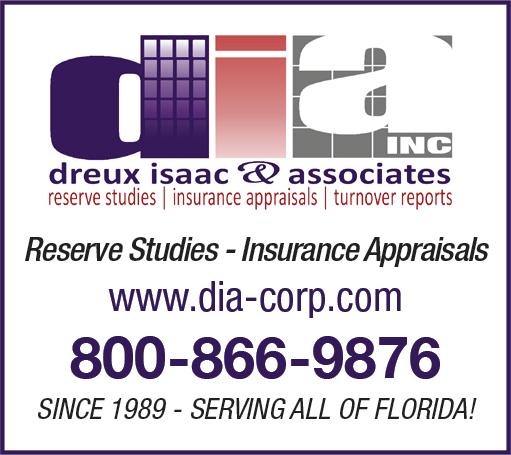




www.OZK.com/association

www.popularassociation

www.Truist.com/
















INSURANCE
Marsh McLennan Agency
101 N. Starcrest Drive



Herbie Wiles Insurance Agency
400 N. Ponce de Leon Boulevard
St. Augustine, Florida 32084 800-997-1961
www.herbiewiles.com
Insuring over 100 FL condo associations and HOAs.

Clearwater, FL 33765
800-966-6481
www.marshmma.com
Rick Carroll Insurance
2160 NE Dixie Highway Jensen Beach, Florida 34958
800-290-3181 or 772-334-3181
www.rickcarroll.com
The Turner Insurance
Advisor Group
2121 NE Coachman Road
Clearwater, Florida 33765
www.turnergroupfl.com
INSURANCE VALUATIONS
Expert Reserve Services Inc. 433 Silver Beach Ave., Suite 104 Daytona Beach, FL 32118
866-480-8236
www.expertreserveservices.com
Covering Florida's Insurance Valuation Needs
PUBLIC INSURANCE
Hunter Claims LLC
4613 N. Clark Avenue
Tampa, Florida 33614
813-774-7634
www.hunterclaims.com
RESERVE








Brian W. Pariser, P.A.
9155 S Dadeland Boulevard, Penthouse 1-Suite 1718
Miami, Florida 33156 305-670-7730
fax 305-670-6203
Condo and HOA Law & Mediation.

Gelfand & Arpe, P.A.
1555 Palm Beach Lakes Boulevard, Suite 1220
West Palm Beach, Florida 33401 561-655-6224
www.gelfandarpe.com



Siegfried Rivera
201 Alhambra Circle, 11th Floor Coral Gables, Florida 33134 800-737-1390
www.siegfriedrivera.com
Experience Personalized Professionalism.

The JD Law Firm 80 S. Knowles Avenue, Suite 7 Winter Park, Florida 407-864-1403
thejdlaw.com
Tripp Scott Law Firm 110 SE 6 Street Fort Lauderdale, Florida 33301 954-525-7500
www.trippscott.com
For over 50 years, Tripp Scott has served our community.
| www.fcapgroup.com

Allied
12350
305-232-1579; 239-241-6499
www.alliedpropertygroup.net
Providing

Cardinal
4670
We


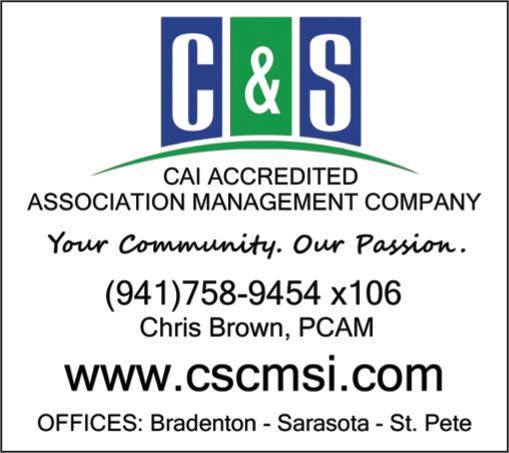
561-641-8554
sales@grsmgt.com

www.kwproperty

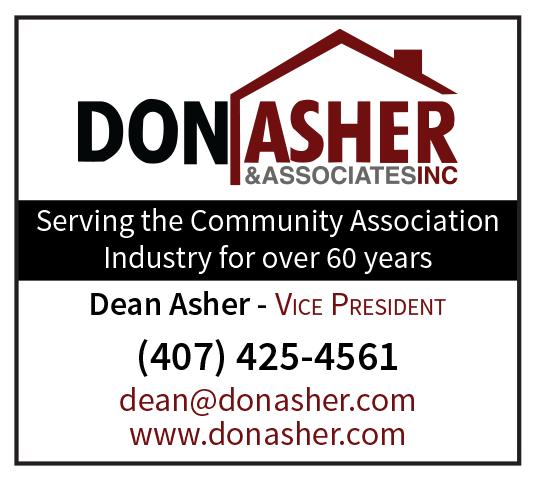

Floridian
fcapgroup.com/nl-sd


Management and Associates
720 Brooker Creek Blvd., Suite 206 Oldsmar, Florida 34677 813-433-2000
www.mgmt-assoc.com

MAY Management Services, Inc.
5455 A1A South St. Augustine, Florida 32080
904-461-9708
www.maymgt.com
Over 20 years in Northeast Florida!

fcapgroup.com/ flcaj/flcaj-articles
Qualified Property Management
5901 US Highway 19, Suite 7 New Port Richey, Florida 34652 877-869-9700
www.QualifiedProperty.com
Proudly Serving HOA, COA, Co-ops, Master Planned Comm. Assoc.

5523 W. Cypress Street, Suite 102 Tampa, Florida 33607 866-403-1588
www.RealManage.com
Serving Orlando and Tampa Communities.

fcapgroup.com/cfcam

Towers Property Management
1320 N. Semoran Blvd., Suite 100 Orlando, FL 32807
407-730-9872
www.towerspropertymgmt.com

fcapgroup.com/nl-sd



| www.fcapgroup.com
ACCESS CONTROL, SECURITY AND CUSTOM GATE AUTOMATION
Smart Entry Systems: 626-213-7557; www. SmartEntrySystems.com; sales@ SmartEntrySystems.com
ALARM MONITORING

ASPHALT REPAIR/ REJUVENATION
Asphalt Restoration Technology: 800-254-4PDC (4732); www.asphaltnews.com.
BALCONY INSPECTIONS
Howard J. Miller, P.E., Inc.: Professional Inspections; Reports; Contract Administration; 561-392-2326.


COMMUNITY SECURITY

CONCRETE RESTORATION


Promar Building Services LLC: Alfredo Amador; 561-598-4549; info@promarbuilding.com
CONCRETE RESTORATION PROJECT MANAGEMENT
Daniello Companies: 888-370-4333; www.concreterepairing.net.
EDUCATION

ELECTRIC
Hypower Electrical & Utility Contractor 888-978-9300; www. hypowerinc.com
ELEVATOR SERVICE/REPAIRS
Connections Elevator: Elevator maintenance agreements, repairs and modernizations; 954-7921234; www.ConnectionsElevator. com.
ENGINEERS
Chalaire & Associates, Inc.: 561-848-7055; www.chalaire andassociates.com.
Consult Engineering, Inc: 941-206-3000; www.consultengineering.com.
CSW Structural Engineers: 954-316-9001; admin@cswsg.net; cswsg.net/#a_home
Howard J. Miller, P.E., Inc.: Reports; Contract Administration; 561-392-2326.
Sign up for our Newsletter fcapgroup.com/nl-sd



NV5: 954-495-2112; nv5.com
Osborn Engineering: 321-7845811; osborn-eng.com PEGroup Consulting Engineers, Inc.: 800-698-2818; 305-655-1115; www.pegroup.com.

Swaysland Professional Engineering Consultants (SPEC): 954-473-0043; 888-264-7732.
FENCING AND GATES

FIRE ALARM SYSTEMS
Bass United Fire & Security Systems, Inc.: 954-785-7800; www.bassunited.com.
Sign up for our Newsletter fcapgroup.com/nl-sd

GENERAL CONTRACTORS
Hartman & Sons Construction, Inc.: 407-699-4549; fax: 407-6990919; Serving Central FL.
INTERNET/TELEVISION/ VOICE SERVICES
Blue Stream: 954-753-0100; www.mybluestream.com
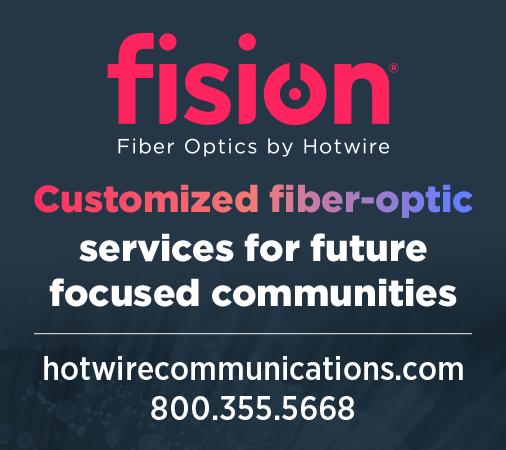
Sign up for our Newsletter fcapgroup.com/nl-sd

JANITORIAL SUPPLIES


LAKE AND WETLAND MANAGEMENT
SOLitude Lake Managment: 888-480-LAKE (5253); info@solitudelake.com solitudelakemanagement.com; Restoring Balance. Enhancing Beauty.
MANAGEMENT SOFTWARE
Yardi Systems: 1-800-866-1144; www.yardi.com
PAINTING

PAINTING AND WATERPROOFING


Lamphier & Company: 407-3301628;

Promar Building Services LLC: Alfredo Amador; 561-598-4549; info@promarbuilding.com
PATIO FURNITURE
Florida Patio Furniture: 866557-2846; floridapatio.net.
PEST/ANIMAL CONTROL
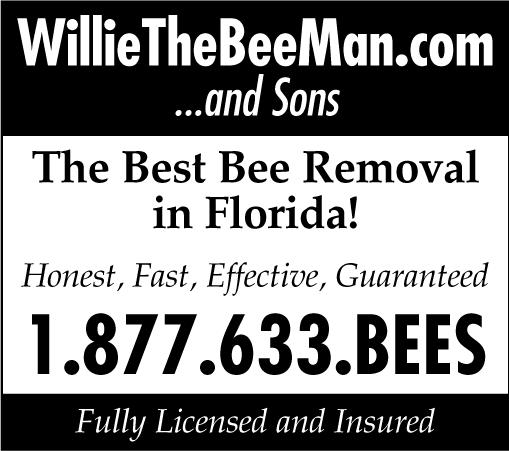
Sign up for our Newsletter fcapgroup.com/nl-sd


PIPELINING
Mike Douglass Trenchless Technologies: (877) 426-8660; www.pipeliningmd.com
ROOF MANAGEMENT & CONSULTING

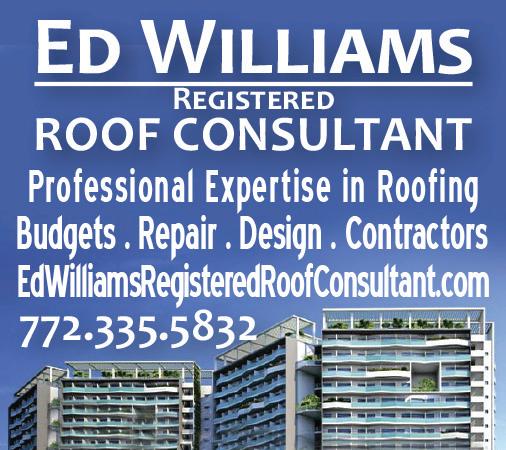

Cool Roof Foam & Coatings: 877-354-3626; coolroof.biz; We're On Top Of It!
Dan Tennis Roofing: 954-4857778; info@dantennisroofing.com; www.dantennisroofing.com


fcapgroup.com/cfcam
SEALANT
Pecora Corporation: 800-5236688; freemana@pecora.com
SECURITY

Ramco Protective: 888-3989700; www.ramcoprotective.com.
SUBMETERING/ WATER BILLING
Think Utility Services: 888696-3837; www.thinkutility services.com.


TRASH CHUTE CLEANING AND REPAIR

TRASH CHUTE ODOR CONTROL
Southern Chute: 954-475-9191; toll free 866-475-9191; fax 954475-9476; www.southernchute.com.
TRASH CHUTE LINING
US ChuteLining: 800-504-6108; www.uschutelining.com.
WATER, SEWER AND DRAINAGE—INSPECTION AND REPAIRS
Hinterland Group: 561-6403503; hinterlandgroup.com




